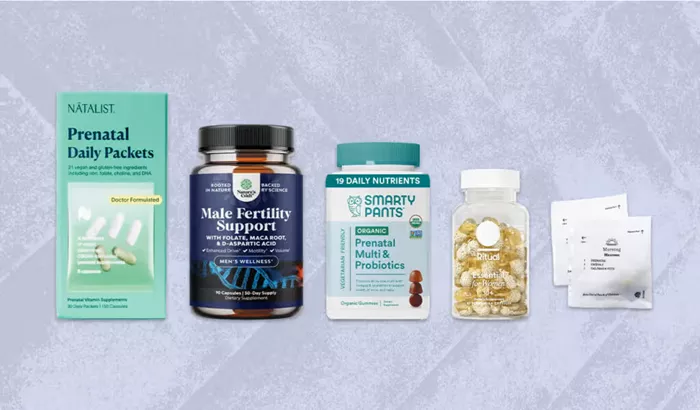Fertility is not just a women’s issue. Men play a big role too. A man’s health, including what he eats, can affect his ability to father a child. One simple step to help boost male fertility is by taking the right vitamins. These vitamins can support sperm health, hormone levels, and overall reproductive function.
Why Vitamins Matter for Male Fertility
Vitamins are natural substances found in food and supplements. They help the body work properly. When it comes to male fertility, certain vitamins are very important. They help the body make healthy sperm, protect sperm from damage, and keep hormone levels balanced.
1. Vitamin C: Protecting Sperm from Damage
Vitamin C is a strong antioxidant. It helps protect sperm from free radical damage. These harmful molecules can reduce sperm count and motility. Studies have shown that men who take vitamin C may have better sperm quality.
Good sources: oranges, strawberries, bell peppers, broccoli
Recommended dose: 500–1,000 mg per day
2. Vitamin E: Improving Sperm Movement
Vitamin E also works as an antioxidant. It helps protect sperm and improve their movement. When sperm move better, they have a higher chance of reaching and fertilizing the egg.
Good sources: nuts, seeds, spinach, avocado
Recommended dose: 200–400 IU per day
3. Vitamin D: Supporting Hormones
Vitamin D helps regulate hormones like testosterone. Low vitamin D levels have been linked to poor sperm quality. Getting enough vitamin D can help improve sperm count and function.
Good sources: sunlight, eggs, fatty fish, fortified milk
Recommended dose: 1,000–2,000 IU per day
4. Zinc: Boosting Testosterone and Sperm
Zinc is one of the most important minerals for male fertility. It helps the body produce testosterone and supports healthy sperm development. Low zinc levels can lead to lower sperm count and less active sperm.
Good sources: red meat, shellfish, beans, pumpkin seeds
Recommended dose: 15–30 mg per day
5. Folate: Supporting DNA in Sperm
Folate is a type of vitamin B. It helps make healthy DNA. For sperm, folate is important because it supports proper formation and genetic stability. Men with low folate may have more sperm with DNA damage.
Good sources: leafy greens, lentils, citrus fruits, fortified cereals
Recommended dose: 400–600 mcg per day
6. Selenium: Helping Sperm Move and Survive
Selenium is a trace mineral that helps with sperm motility. It also protects sperm from damage. Men who do not get enough selenium may have trouble with sperm quality.
Good sources: Brazil nuts, tuna, eggs, sunflower seeds
Recommended dose: 55–100 mcg per day
7. Coenzyme Q10: Energizing Sperm Cells
Coenzyme Q10 (CoQ10) helps create energy in cells. It acts like a battery charger for sperm. CoQ10 can increase sperm count and improve their movement.
Good sources: meat, fish, whole grains (often taken as a supplement)
Recommended dose: 100–300 mg per day
8. L-Carnitine: Improving Sperm Function
L-Carnitine is an amino acid that helps sperm produce energy. This energy boosts their ability to move and function. It is often recommended for men with low sperm motility.
Good sources: red meat, dairy, chicken (also in supplement form)
Recommended dose: 1,000–2,000 mg per day
9. Omega-3 Fatty Acids: Supporting Sperm Shape and Fluidity
Omega-3s help sperm have the right shape and structure. They also improve sperm motility and protect sperm from inflammation. These healthy fats are essential for overall male reproductive health.
Good sources: salmon, flaxseed, walnuts, fish oil supplements
Recommended dose: 500–1,000 mg EPA/DHA daily
10. B12: Supporting Sperm Production
Vitamin B12 helps make red blood cells and supports sperm production. It also protects sperm DNA and helps maintain healthy hormone levels. A deficiency in B12 can reduce fertility.
Good sources: meat, eggs, dairy, fortified cereals
Recommended dose: 1,000 mcg daily (especially in supplement form)
Other Healthy Habits to Support Fertility
While vitamins help, men should also focus on healthy habits. Avoid smoking, limit alcohol, reduce stress, and maintain a healthy weight. Regular exercise and good sleep also support hormone balance and fertility.
When to See a Doctor
If a couple has been trying to conceive for over a year with no success, it’s time to talk to a doctor. A fertility test can help find out if something else is affecting sperm health. In some cases, a specialist may suggest medical treatment or lifestyle changes.
Conclusion
Improving male fertility doesn’t have to be complicated. The right vitamins can boost sperm health, support hormones, and increase the chances of conceiving. Eating healthy foods and taking the right supplements can make a big difference. It’s a small change that could lead to a big joy—becoming a father.
FAQs
Q1: Can taking too many vitamins harm fertility?
Yes. Taking too much of certain vitamins like vitamin A or zinc can cause harm. Always follow the recommended doses or ask a doctor before starting any new supplements.
Q2: How long does it take for vitamins to improve sperm?
Sperm take about 2–3 months to fully develop. Most men need at least 90 days of taking vitamins consistently to see an improvement in sperm health.
Q3: Can I get all these vitamins from food alone?
It’s possible, but difficult. A balanced diet helps, but some men may need supplements, especially if they have deficiencies or specific fertility problems. A doctor can help decide what’s best.
Related topics:
- What Tests Are Done To Check Male Fertility?
- 5 Science-Backed Ways Men Over 40 Can Boost Fertility
- How Diet Affects Male Fertility and Sperm Quality


